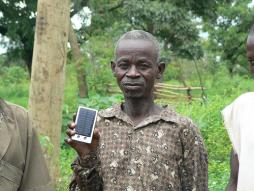Refugees often experience a compound trauma: The situation that caused them to flee in the first place, as well as the fact that many families become separated during migration. For refugee's health and well-being and ability to resettle, it is vital to know the whereabouts of relatives, their safety, and their ability to remain in contact. Today, mobile phones are the most important technology for refugees to find relatives and remain in contact.
The Forced Migration Review Issue 38, The Technology Issue covers technologies for refugees in particular. Two chapters shine a light on the use of mobile phones among refugees, as well as some of the problems with this tech to find and contact family member such as issues of security, and accessibility.
Phoning Home
Drawing from a workshop with refugees, their advocates, NGO staff, and researchers, "Phoning Home," by Linda Leung examines refugees' ways of remaining in contact with family elsewhere. As a companion piece to the University of Technology Sydney research paper,Technology's Refuge that analyzes ways in which refugees use communication technologies, Leung describes the barriers to refugee usage of mobile phones.
The refugees interviewed in Leung's article, resettled in Australia, felt that while there were many technologies open to them in contacting relatives, the limited technologies on the other end of the line caused constraints. The relatives were primarily located in low-income countries where services were not easily available. Challenges included the family only having access to a shared phone, poor connections, and lack of any or consistent electricity which all made communication difficult. In addition to issues of access, refugees also noted prohibitive costs and a dearth of tech skills as obstacles.
Typically it was the resettled refugees who paid for communications back home, but this too was a negotiation. Most people used mobile phones and phone cards and initiated calls themselves, though some preferred to send money to relatives instead. Refugees found that certain providers offered better prices for some services – a skill in comparison shopping that nonetheless takes time and effort. Additionally, some interviewed feared about the security of communications back home, namely wiretapping and surveillance of communications of family members.
Some recommendations suggested by refugees and advocates included a regulatory body for phone cards and mobiles to increase accountability, ICT training to increase computer literacy, an official source of service providers and best options, and some web-based solutions for the resettled refugees.
Refugees United Project
"The Role of Technology in Family Tracing in Kenya," by Lucy Kiama, Christopher Mikkelsen, Caroline Njeri, and Mikkel Hansen looks at Refugees United Project (RUP) of the Refugee Consortium of Kenya and Refugees United. The RUP is a searchable database of refugees within Kenya. The initiative allows refugees to create a profile with a high level of anonymity, and search for relatives through internet-enabled mobile phones or via a computer. A refugee registers for the program, creates a profile, can search for relatives, and can use the internal messaging system to contact possible relatives.
The Refugee Consortium of Kenya works in refugee camps and urban areas, conducting workshops and community awareness forums about RUP. Staff register interested refugees, and cover usage and security of the platform in-depth, though refugees with serious concerns about security are told not to register. The platform is built with some security in mind, allowing the user to provide as little information as they feel comfortable, with many users choosing to use a "changed" name and only divulging details that close family would know. The platform does not save location information beyond the country of residence. The platform has its own encrypted messaging system, and refugees can be guided through the process of responding to messages. More details on security can be found in The Role of Technology in Family Tracing in Kenya and here.
In the first 12 months of operation from mid-2010 to 2011, over 46,000 refugees registered with the program. This number represents a majority of clients seen by the Refugee Consortium of Kenya. In order to work, of course, the number of registered refugees must reach critical mass so the Consoritum has stepped up its awareness efforts.
The project faces two main challenges at the moment. The first is a concern over security. Some refugees were concerned that governments or other actors might use the platform to repatriate them or compromise their safety. Some also feared that political or armed groups could try to recruit through the platform. The Consorotum has increases education and security measures to address these concerns. The second obstacle is that while most refugees have mobile phones, most are not internet-enabled. A smartphone app is under development and a text-based service is in the works but has yet to be rolled out. You can read more about the Refugees United Project in our in-depth article here.
Finding and remaining in contact with family plays a central role in the process of recovery for refugees. That mobile phones have become commonplace is promising for communications among refugees and their families, their resettlement, and physical and mental health. However, refugees remain concerned about their security and the security of their relatives , and limited access to consistent, high-quality services constitute a significant barrier to their use.
Photo courtesy IICD


Post new comment